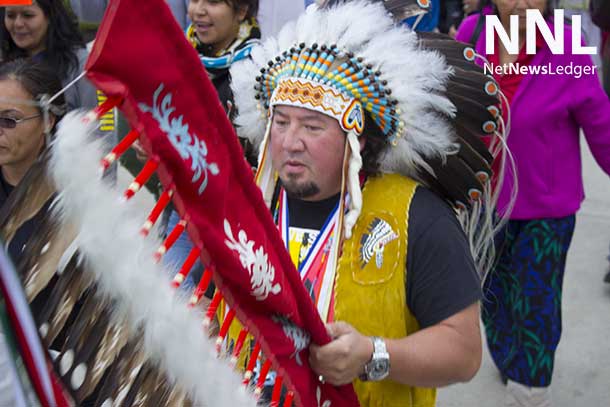
WINNIPEG – Assembly of Manitoba Grand Chief Derek Nepinak has sent an open letter to the Premier of Saskatchewan Brad Wall regarding treaty rights and hunting matters in the province:
Please accept this letter as an expression of concern and disappointment over hunting matters transpiring in the ancestral & treaty lands of Indigenous peoples, now referred to as Saskatchewan and Manitoba.
As you are hopefully aware, Treaties negotiated between Indigenous Nations and the Crown are the foundation of all laws and Constitutions that bind both provincial and federal governments in Canada. Treaties are referenced in Canada’s Constitution and special provisions have been negotiated by leaders of the past to ensure that Treaties are respected in perpetuity. This basic understanding should be foundational to any leader in any form or type of government.
Treaties created rights for all parties who might join us in a new Treaty based relationship. More particularly, Treaties allowed for the establishment of land tenure systems that would open up the land for settlement in lands otherwise used and lived upon by Indigenous peoples. This means, practically speaking, that the fee simple land tenure system that is to the benefit of those who can participate, is a right accruing to all parties as participants in the land tenure system flowing from Treaty. This is particularly important in any discussion regarding rights of access and right of ways needed to affirm other commitments of the Treaty based relationship.
Treaties also affirmed freedoms of the Indigenous peoples who have always called these lands our home. These freedoms include unencumbered access to our ancestral lands in pursuit of vocations that keep us healthy and alive. In negotiating Treaty, under no circumstances was their agreement that any Crown agency or legislative regime would set regulations, policy or law to encumber the freedoms of the Indigenous participants to Treaty. To do so, is to restrict a freedom and compromise the food security of our communities. This would undoubtedly require significant negotiation and justifications that are not currently apparent. Common law jurisprudence in Canadian domestic courts affirms this principle.
In recent weeks, a questionable and uncertain set of circumstances has resulted in your governments attempt to frustrate and/or or prevent Indigenous hunters from exercising their freedoms in our ancestral lands. These attempts include; the use of threat of force; forced disclosures of otherwise private information; threat of infringements on liberty and threat of public labeling of Indigenous hunters as outside of the scope of lawful persons. Being that there is no lawful or duly authorized basis in law for these actions to be undertaken against Indigenous hunters, these actions have been taken as harassment, bullying and outside the scope of authority of provincial governments employees. These tactics are being employed by men and women bearing arms and wearing the crest of the province of Saskatchewan in the commissioning of their activities.
Well established Canadian legal precedent ensuring Indigenous access to land and our healthy food sources has been hard fought in a post-1982 Canada. These standards bind all persons in regulatory, legislative and compliance capacities. As such, it is apparent that any attempt to execute the mechanisms of ‘law enforcement or compliance’ must meet the minimum standards as set in Canadian law in order to be lawful.
The indices of health for Indigenous peoples identifies that we need access to our traditional food sources in order to live long healthy lives. In recent decades, it is inarguable that there is a correlation between a growing limitation of access to our traditional food sources and the explosion of diabetes to epidemic levels in our families. As such, the ability of a hunter to bring home natural foods to their families is critical to the health of the family.
In light of the issues at hand, I would like to extend to you the opportunity to meet with Indigenous leadership to begin a discussion about deconstructing the colonial legal and regulatory regimes of the past and begin moving in the direction of truth and reconciliation. To this end, I will always be personally open to meet with you.
Respectfully submitted,
ASSEMBLY OF MANITOBA CHIEFS
Derek J. Nepinak, LLB, B.A.(Hons.)
Grand Chief, Assembly of Manitoba Chiefs
- Chief Bobby Cameron, Federation of Saskatchewan Indian Nations National Chief Perry Bellegarde, Assembly of First Nations Premier Greg Selinger, Province of Manitoba
Manitoba Chiefs






